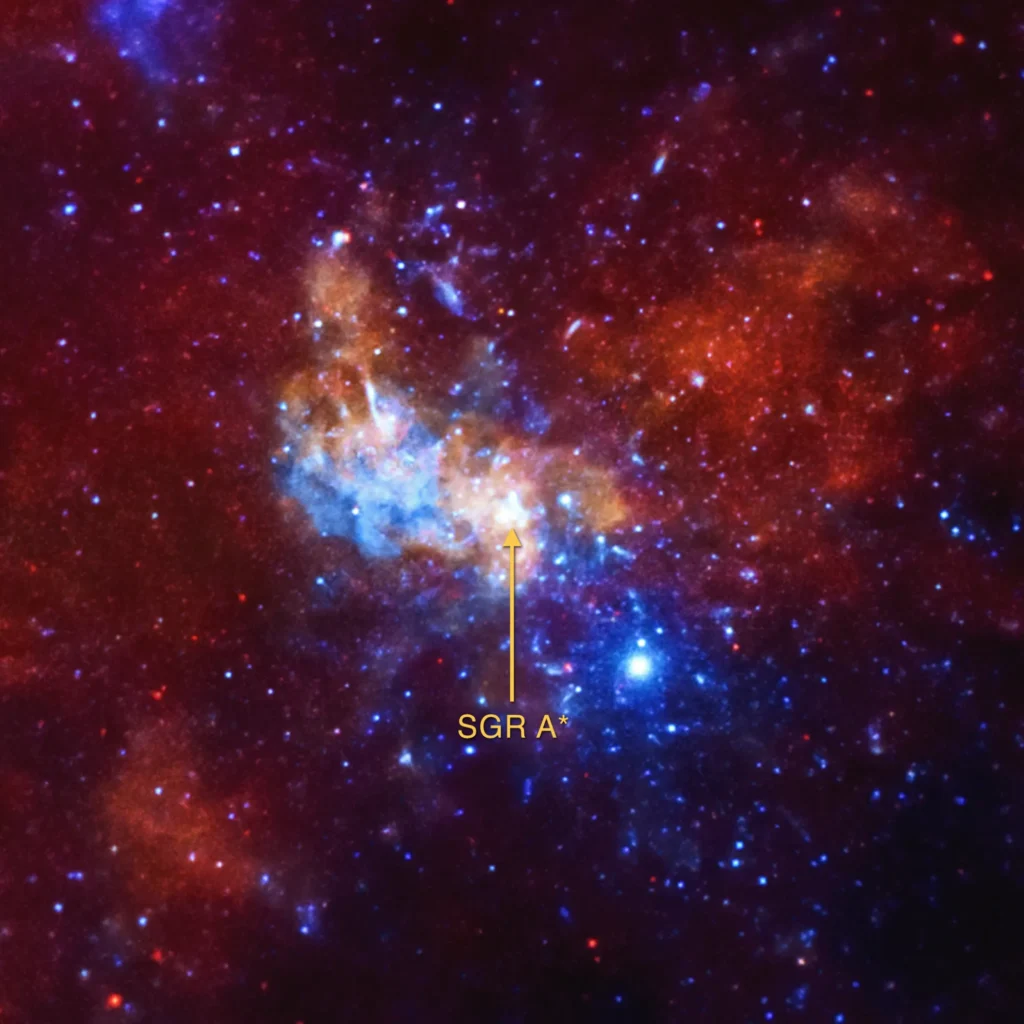This artist’s rendering highlights the insights from a recent study on the supermassive black hole at our galaxy’s core, known as Sagittarius A* (Sgr A*). According to a press release detailing these findings, Sgr A* exhibits such rapid rotation that it distorts spacetime—merging time with the three spatial dimensions—into a shape resembling a football.
These groundbreaking observations were conducted using NASA’s Chandra X-ray Observatory and the NSF’s Karl G. Jansky Very Large Array (VLA). Researchers employed an innovative technique combining X-ray and radio signals to gauge the speed of Sgr A*’s spin, based on the movement of matter towards and away from the black hole. Their analysis indicates that Sgr A* rotates at approximately 60% of its maximum potential speed, with its angular momentum reaching about 90% of the theoretical maximum.
Black holes are primarily characterized by two features: their mass and their spin. The latter, in particular, offers profound insights into a black hole’s nature and its interactions. Previous attempts to measure Sgr A*’s rotation have yielded varying estimates, from no rotation to near-maximum rotation.
This latest study posits that Sgr A* spins at an exceptionally high rate, significantly compressing the surrounding spacetime. The provided illustration cuts through Sgr A*, showing material orbiting in a disk around it. The black circle at the center represents the event horizon, beyond which escape is impossible, even for light.
From a side view, as depicted in the illustration, the warped spacetime around the spinning black hole takes on a football-like shape, becoming flatter with increased spin.
The swirling gas around Sgr A*, shown in yellow-orange, is drawn towards the black hole, crossing the event horizon once it enters the football-shaped spacetime, creating a cavity in this area. Blue blobs illustrate jets emanating from the black hole’s poles. Viewed from above, spacetime appears circular along the jet’s path.
The spin of a black hole can unleash significant energy, with spinning supermassive black holes generating focused outflows, such as jets, when their rotational energy is tapped. This requires some material presence near the black hole. Although Sgr A* has been relatively dormant in recent millennia, displaying weak jets due to scarce surrounding material, this study suggests a potential shift if more matter accumulates near Sgr A*.

To ascertain the spin rate of Sagittarius A* (Sgr A*), the research team employed a method grounded in empirical evidence known as the “outflow method.” This approach examines the correlation between the black hole’s spin and its mass, the characteristics of nearby matter, and the features of the outflow. The focused outflows are identified by their radio wave emissions, while the gas disk encircling the black hole generates X-ray emissions. By integrating data from the Chandra Observatory and the VLA with an independent assessment of the black hole’s mass obtained from other telescopes, the researchers were able to determine the spin of the black hole.
The study documenting these findings, led by Ruth Daly from Penn State University, is featured in the January 2024 edition of the Monthly Notices of the Royal Astronomical Society. It is available for online viewing at https://ui.adsabs.harvard.edu/abs/2024MNRAS.527..428D/abstract. Contributing authors include Biny Sebastian from the University of Manitoba, Canada, Megan Donahue from Michigan State University, Christopher O’Dea, also from the University of Manitoba, Daryl Haggard from McGill University, and Anan Lu from McGill University.
The Chandra program is overseen by NASA’s Marshall Space Flight Center. The Chandra X-ray Center at the Smithsonian Astrophysical Observatory is responsible for the scientific and flight operations, which are conducted out of Cambridge, Massachusetts, and Burlington, Massachusetts, respectively.


